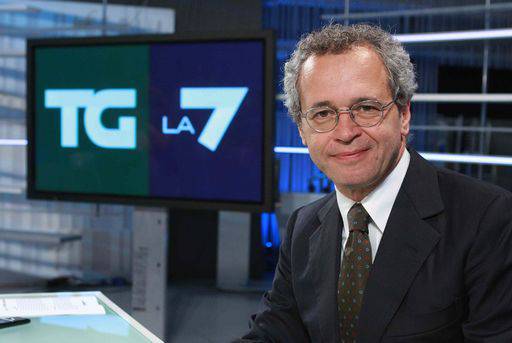![]()
By Gaither Stewart
(with apologies for my digressions)
SECRETIVE MEDIA: IMPARTIALITY AND BIAS REDUX
Conservatives may be using the stiletto against a reformist pontiff.
Dispatch from Rome
23 October 2015
CLICK ON IMAGES FOR BEST RESOLUTION
Last weekend TGP posted here my article, Bias and Objectivity in Journalism, which sparked a number of thought-provoking and wide-ranging comments on various serious subjects, some of which zeroed in on the precise subject of the original article: the degeneration of mainline journalism into the banality of [putative] impartiality and non-bias. As if willed by the Lord of Chance an event occurred in Rome a few days later that obliged me to return to one aspect of the subject: secrecy in journalism or what the media do not say which they should say.
On the evening of last Wednesday I witnessed 30 minutes of reluctant-to-tell-the-truth TV journalism on one of Italy’s major television newscasts on the “relatively” independent La 7 at 8 p.m., a nightly program conducted by one of the country’s most talented TV journalists, Enrico Mentana.

On that day a sensational news item launched by one of Italy’s oldest newspapers, the centrist daily, Il Resto del Carlino, circulated throughout Italy and quickly re-bounded throughout the world: “Pope Francis is seriously ill… a tumor on the brain.” At that point most media paused before adding that according to the Vatican the tumor was benign, though perhaps inoperable.
Here I should explain that the Vatican, the Holy See and the Papacy itself are pillars of political power in Italy. No Italian government can survive without some sort of accommodation with the Catholic Church. It is not just cheap chatter that many observers (also Italians) believe that the presence of the Vatican in Rome—even in Italy—has long been one of the major obstacles preventing Italy from becoming a “normal” country. Some people would like to see the Papacy back in Avignon where it was installed from 1309 to 1377 (Wikipedia). If not there, then at least in Florence!
The TV journalist Mentana headlined his telecast with the news of the Pope’s putative tumor, explaining then that in the name of good journalism he was obligated to explain both sides of the question. That is, the facts. Shortly afterwards, he reported, the Vatican had issued a strong denial: “The Pope is healthy.” And the Pope himself did not even mention the subject of his health in his usual Wednesday appearance before his enormous flock waiting below his balcony facing St. Peter’s Square.

Francis among Curia members—if it resembles a US president walking into Congress, it is not accidental. Many in the Vatican Curia are essentially politicians. (Click on image for max. resolution.)
At the end of the evening of the telecast and still on the following day the public did not know if the Pope was ill, nor how serious it was … or if he was healthy though he had an inoperable tumor. The billion Catholics of the world only knew that either their Pope was seriously ill (believers here and there were shown crying and wiping their eyes) or that the news was false and the Pope was a healthy man.
[dropcap]O[/dropcap]nly after closer examination has the possibility of a Vatican-inspired conspiracy emerged, a conspiracy of which the general public remains unaware. A conspiracy that concerns more the spiritual health of Pope Francis than a fantomatic brain tumor. Whatever the observer’s personal evaluation of Pope Francis, the Argentinean Jorge Bergoglio is above all an anomalous pope: a modern, open-minded reformist for some, the anti-Christ for others. Most certainly he is unorthodox and for fundamentalists a danger to the continuity and purity of the Roman Catholic Church for which unorthodoxy is synonymous with schism.
Neither a Catholic nor a Vaticanologist myself, I nonetheless misjudged Bergoglio from the start. Because of his close relationship with the brutal military dictatorship in Argentina in the years 1975-83, when he was elected I suspected he would be a super-orthodox pope whose role was to create order in the reigning religious chaos within the World Church and in the war against both Islam and against homosexuality and same-sex marriage. Instead, though still very much the Pope of the Roman Church, he has disconcerted electors especially among the conservative elements that elected him. Also among conservative European Catholics in general who had expected the election of a European, fearful of further decline of the Eurocentrism of the Church so linked to Europe and that at a time when Europe itself had begun to count less and less in the world.
After his election, Pope Bergoglio’s first words to the huge crowd that had waited for hours in a pouring rain on St. Peter’s Square for the outcome of the papal conclave and the name of their new Pope are still memorable: Buona sera! Good evening. During his short greeting the ex-Archbishop of Buenos Aires never referred to himself as Pope but as the Bishop of Rome and asked the faithful to pray for him. Vatican specialists and theologians agreed that his simplicity signaled an authentic change of guard in the Roman Church so fixed in its traditional pomp and ritual.
Pope Francis however had an uphill battle awaiting him within the powerful Roman Curia, that is, the Holy See, allergic as it is to simplicity as to any change or infringement on their power and influence. Today a settling of accounts is in the air. The cynical Curia Romana could even plan to blackmail and call to order Pope Francis because of his silence during the Argentine military dictatorship.
[dropcap]S[/dropcap]o why now a conspiracy against their Pope by Church prelates who hate nothing more than public controversy, except the mere idea of genuine reforms? The current Synod of Bishops convening in Rome may have been the perfect occasion for conservatives. The Synod of Bishops is an advisory body for the popes, a group of bishops from around the world who guarantee for the unity between the Roman Pontiff and Catholic leaders throughout the world chiefly with counsel concerning discipline and continuity of the Roman Catholic Church. This month the bishops are meeting in Rome about the topic of family and marriage, in reality a clash between those conservatives and the progressives who urge reforms on issues such as homosexuality and same-sex marriage. Today it is apparently more than suspicion that the Pope’s tumor rumor was part of a conspiracy not only against Pope Francis but against reformists in general. A sick Pope is a weak Pope.
Traditional views and well-established practices are signs of the true faith in most religions (as well as in ideologies), Resistance to change in doctrine or practice have marked the history of the Roman Catholic Church. Abandonment of traditional beliefs in the name of modernity threatens the continuity of the 2000-year old faith. Conservatives believe that relaxation of rules on pre-marital sex, divorce, contraception, abortion and today homosexuality and same-sex marriage threaten the foundations of the Church. And Pope Francis, Jorge Bergoglio, with his mixture of secularism and orthodoxy, a Dostoevskian-like pope whose new theology seems to prioritize love of man and the unity of all men over love for the Church, is a mina vagante, a time bomb, threatening the fundamentalists of the Catholic Church. And fundamentalists, we know, are the fanatics, ever alert for deviations, ready for holy war on any front. They have been the masters of secrecy and deception since they were the heretics hiding out from pagan Romans in Rome’s catacombs until the day their Christianity became the official state religion. Centuries later the former heretics formed their own secret tribunals—the Inquisition—and burned at the stake on Rome’s Camp of Flowers doctrinal deviationists like Giordano Bruno.
The life of one Pope is not an impediment to the fundamentalist view of the purity of the faith. After Pope Francis’ views of the Church quickly emerged, no few cynical Romans speculated that he was destined to an early end.
Yet today 1.1 billion Catholics—for whom their Pope is divine, a near god who like other former Pontiffs will also become a Saint—are in the dark. Transparency is a stranger in the corridors of the Vatican. Despite (or because of) the 270 bishops or cardinals and hundreds of specialists and advisers gathered in Rome for the synod, simple believers do not even know their leader is threatened. The Vatican press chief has presented the facts, letters of reassurance of Pope Francis’ health have been dispatched, the world press has been informed, the Japanese specialist who allegedly examined the Pope has been interviewed. Many well-selected facts have been diffused. Today, October 22, Pope Francis closed the gathering with a warning to the fundamentalists: “Times change and the World Church must change without fear.”

Pope Francis meets with Cardinals and Bishops of the Vatican Curia in the Clementine hall at Vatican, Monday, Dec. 22, 2014.
Yet, Catholics of the world remain in the dark as to what is really happening in their Church. Meanwhile, behind the public scenes, schism is in the air. And even though secrecy and mystery have always reigned in the Vatican and the Holy See in Rome and even though the Pope himself cannot control different thinkers in the USA or Germany, the majority of world Catholics are still not used to dissidence within their Church.
 Senior Editor Gaither Stewart serves as The Greanville Post and Cyrano’s Journal Today European correspondent. A retired journalist, his latest novel is Time of Exile (Punto Press). He’s also the author of several other books, including the Europe Trilogy, of which the first two volumes (The Trojan Spy, Lily Pad Roll) have been published by Punto Press. These are thrillers that have been compared to the best of John le Carré, focusing on the work of Western intelligence services, the stealthy strategy of tension, and the gradual encirclement of Russia, a topic of compelling relevance in our time. He makes his home in Rome, with wife Milena. Gaither can be contacted at gaithers@greanvillepost.com. His latest assignment is as Managing Editor with the Russia Desk.
Senior Editor Gaither Stewart serves as The Greanville Post and Cyrano’s Journal Today European correspondent. A retired journalist, his latest novel is Time of Exile (Punto Press). He’s also the author of several other books, including the Europe Trilogy, of which the first two volumes (The Trojan Spy, Lily Pad Roll) have been published by Punto Press. These are thrillers that have been compared to the best of John le Carré, focusing on the work of Western intelligence services, the stealthy strategy of tension, and the gradual encirclement of Russia, a topic of compelling relevance in our time. He makes his home in Rome, with wife Milena. Gaither can be contacted at gaithers@greanvillepost.com. His latest assignment is as Managing Editor with the Russia Desk.
Note to Commenters
Due to severe hacking attacks in the recent past that brought our site down for up to 11 days with considerable loss of circulation, we exercise extreme caution in the comments we publish, as the comment box has been one of the main arteries to inject malicious code. Because of that comments may not appear immediately, but rest assured that if you are a legitimate commenter your opinion will be published within 24 hours. If your comment fails to appear, and you wish to reach us directly, send us a mail at: editor@greanvillepost.com
We apologize for this inconvenience.
![]() Nauseated by the
Nauseated by the
vile corporate media?
Had enough of their lies, escapism,
omissions and relentless manipulation?
Send a donation to
The Greanville Post–or
But be sure to support YOUR media.
If you don’t, who will?






